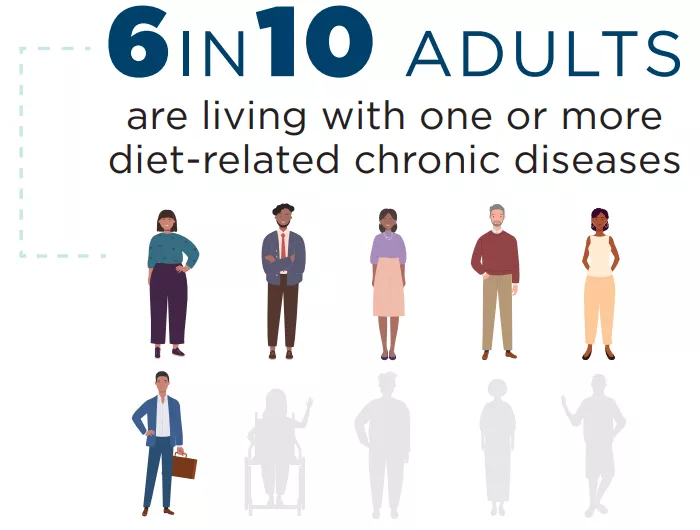Kennedy, Rollins urged to uphold DGAC recommendations

DietaryGuidelines.gov.
Guidelines should retain saturated fat limit to reduce heart disease
Fifty-five public health and medical organizations are calling on Health and Human Services Secretary Robert F. Kennedy, Jr., and U.S. Department of Agriculture Brooke Rollins to adopt the advice of the 2025 Dietary Guidelines Advisory Committee as their agencies finalize the final Dietary Guidelines for Americans.
The Dietary Guidelines, published every five years by HHS and USDA, have remained remarkably consistent from one administration to the next, and generally recommend whole, nutrient-dense foods. Besides representing the government’s basic nutrition advice to its citizens, the Guidelines shape important federal food programs like the school meals program. Since the inception of the DGAC in 1985, the Guideline's core recommendations have been based on the evidence summarized in their scientific report, the most recent of which was released in December.
The Center for Science in the Public Interest and the other groups are especially concerned whether the Dietary Guidelines for Americans will continue its recommendation to limit saturated fat, which is commonly found in higher amounts in beef, full-fat dairy products, and butter.
“The scientific consensus remains clear: saturated fat is consistently linked with increased risk of cardiovascular disease, and replacing saturated fat with unsaturated fats, particularly polyunsaturated fats, has well-documented benefits for cardiovascular health,” the groups wrote.
The current Dietary Guidelines for Americans, published at the end of President Trump’s first term in office, recommended that people aged 2 and older limit saturated fat to less than 10 percent of calories. The scientific report of the DGAC recommends maintaining this limit, with a new emphasis on replacing animal sources of saturated fat with unsaturated fats, like those found in plant-based proteins and oils.
The groups also defended the Dietary Guidelines Advisory Committee against allegations contained in the report on chronic disease published by the Make America Healthy Again Commission, on which Kennedy and Rollins sit. That report questioned the trustworthiness of the DGAC and speculated that its recommendations are impacted by financial conflicts of interest among committee members.
“While there is always room for improvement in the disclosure and management of conflicts of interest on the DGAC, over time their evidence review process has become increasingly transparent and systematic, and it is designed to minimize bias,” the groups wrote. “Adopting the science-based recommendations of the DGAC would align your administration with those who have stood firm against industry influence, as you have promised.”
CSPI will be looking to see if any of Secretary Kennedy’s unscientific personal nutrition beliefs seep into the Dietary Guidelines. Kennedy has advocated frying in beef tallow, drinking unpasteurized milk, and has spread conspiracy theories on seed oils.
“If the next version of the Dietary Guidelines for Americans recommends replacing seed oils with beef tallow, that would be the exact opposite of current science-based advice to reduce the risk of heart disease,” said CSPI President Dr. Peter G. Lurie. “And it would be a clear sign they’ve decided to discard the evidence base in favor of one individual’s pet peeves.”
Besides CSPI, signatories on the letter to Kennedy and Rollins include the American Academy of Pediatrics, the Chef Ann Foundation, Earthjustice, Moms Rising, and Partnership for a Healthier America.
# # #
Tags
Topics
Contact Info: Lisa Flores, 202-777-8368 or Jeff Cronin, 202-777-8370

